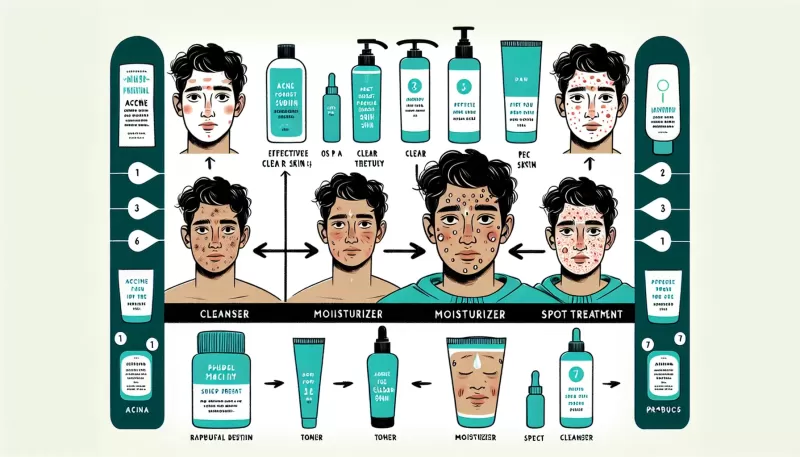Ultimate Guide to the Best Acne Skin Care Routine for Clear Skin

Discover the ultimate acne skin care routine to achieve clear skin. This comprehensive guide covers everything from cleansing to targeted treatments, ensuring you have the information needed to combat acne effectively.
Acne is a widespread concern that affects individuals across all ages, prompting the need for an effective skin care routine. Achieving clear skin requires a combination of consistent care, quality products, and a deep understanding of what triggers your acne. This guide delves into the best acne skin care routine, incorporating scientific insights and dermatologist recommendations to address the root causes of acne and promote a healthy complexion.
Understanding Acne
Before diving into the acne skin care routine, it's crucial to understand what acne is and what causes it. Acne is a skin condition characterized by the occurrence of pimples, blackheads, whiteheads, and sometimes, cysts and nodules. It's primarily caused by the overproduction of oil, clogged pores, bacteria, and inflammation. Hormonal changes, stress, diet, and genetics can also influence acne's prevalence and severity.
Step 1: Gentle Cleansing
Starting with a gentle cleanser is essential for any skin care routine, especially for acne-prone skin. A suitable cleanser will remove excess oil, sweat, and dirt without stripping the skin's natural oils or causing irritation, which can exacerbate acne. Look for products that are non-comedogenic and free from harsh soaps.
Step 2: Exfoliating with Care
Exfoliation is key to removing dead skin cells that can clog pores and lead to breakouts. However, over-exfoliation can irritate the skin and increase oil production. Opt for a chemical exfoliator containing salicylic acid or glycolic acid, which are effective yet gentle on the skin. Limit exfoliation to 2-3 times per week to prevent irritation.
Step 3: Applying Acne Treatments
Acne treatments come in various forms, including spot treatments, serums, and lotions. Key ingredients to look for include benzoyl peroxide, which kills bacteria; retinoids, which prevent clogged pores; and niacinamide, which reduces inflammation. Consult with a dermatologist to identify the best treatment options for your specific type of acne.
Step 4: Moisturizing
Hydration is crucial, even for acne-prone skin. Skipping moisturizer can lead to dehydration, prompting your skin to produce more oil. Choose lightweight, oil-free moisturizers that deliver hydration without clogging pores. Products containing hyaluronic acid or aloe Vera are excellent choices for acne-prone skin.
Step 5: Sun Protection
Protecting your skin from the sun is a vital step in any skin care routine, particularly for those using acne treatments that can make skin more sensitive to UV rays. Use a broad-spectrum sunscreen with an SPF of 30 or higher every day, even when it’s cloudy. Look for sunscreens labeled as non-comedogenic to ensure they won't clog your pores.
Additional Tips for Clear Skin
Maintain a Balanced Diet
Eating a healthy, balanced diet can also impact your skin. Foods high in sugar and dairy have been linked to acne in some studies. Incorporating fruits, vegetables, lean proteins, and whole grains into your diet can help maintain clear skin.
Stay Hydrated
Drinking plenty of water throughout the day helps flush toxins from your body and maintain the health of your skin.
Manage Stress
Stress can worsen acne by increasing cortisol levels, leading to increased oil production. Engage in stress-reduction techniques such as yoga, meditation, or deep-breathing exercises to keep stress in check and improve your skin’s appearance.
Regular Dermatologist Visits
Regular check-ups with a dermatologist can be pivotal in managing acne. Dermatologists can provide personalized advice, prescribe treatments, and help you adjust your skin care routine as needed.
Conclusion
Establishing the best acne skin care routine requires patience and perseverance. By understanding the causes of acne, choosing the right products, and adopting a holistic approach to your well-being, you can achieve clear, healthy skin. Remember, what works for one person may not work for another, so be prepared to fine-tune your routine with the guidance of a dermatologist.
The journey to clear skin is a gradual process, but with the right care, you can combat acne effectively. Embrace these steps and additional tips to nurture your skin and enhance your overall skin health.



























